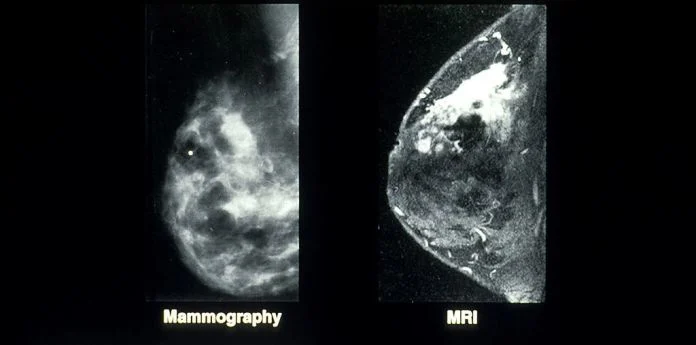An accelerated MRI protocol for breast cancer screening takes only three minutes, but data show it is comparable to a regular MRI which can last as long as 21 minutes, and is more accurate than digital mammography. A proof-of-concept study, published in the Journal of Clinical Oncology, said the accelerated MRI worked as well as regular MRI for detecting 11 invasive breast cancers that had escaped detection by regular mammography.
MRI is becoming an increasingly popular technique for breast cancer screening as there is no ionising radiation involved, Christiane A. Kuhl, MD, of the University Hospital of Aachen (Germany) told Medscape Medical News. Compared with digital mammography, Dr. Kuhl said, MRI is highly sensitive and overdiagnosis is less of a problem.
Dr. Kuhl and colleagues "stripped down MRI to the essential part" that makes for fast image acquisition. For the three-minute MRI, the radiologist reads the first post-contrast subtracted (FAST) and maximum-intensity projection images. This is in contrast with the full diagnostic protocol in which all the images are read. The accelerated protocol's screening accuracy is similar to that of a full diagnostic MRI, Dr. Kuhl's team emphasised.
443 Asymptomatic Women in the Study
Dr. Kuhl's study included 443 asymptomatic women at mild to moderate risk for breast cancer. All of the women had undergone digital mammography, and those with dense or extremely dense breasts had also undergone ultrasound screening, all with negative results.
The women then underwent MRI screening through which 11 breast cancers — seven invasive cancers and four ductal carcinoma in situ — were identified. The detection of these 11 cancers provided an additional cancer yield of 18.3 per 1,000.
Elizabeth A. Morris, MD, chief of breast imaging services at the Memorial Sloan Kettering Cancer Center in New York City, has described the accelerated MRI as "a huge step forward" in breast cancer screening. The negative predictive value was 99.8 percent.
"Data clearly demonstrate that FAST breast MRI could be the standard for breast cancer screening: it is safe, does not induce cancers, and can find more cancers than mammography," Dr. Morris writes in an accompanying editorial seen in the Journal of Clinical Oncology.
The FAST breast MRI, however, is deemed not appropriate for diagnostic studies. "The early phase after injection of the contrast agent is best suited to visualise enhancements; other images are used to characterise enhancing structures. That's why the accelerated protocol is appropriate for screening and not diagnostic purposes," Dr. Kuhl noted.
The study is very important because it produced a significant yield from FAST MRI screening even after ultrasound and mammography, according to Wendie A. Berg, MD, PhD, professor of radiology at the Magee-Women's Hospital of UPMC at the University of Pittsburgh School of Medicine.
Dr. Berg, however, cited the need to reproduce these results at other centres with other experienced readers. Dr. Morris concurred, saying "we do not want a lot of false positives." The FAST MRI protocol has a sensitivity of 94.4 percent (compared with the full diagnostic MRI) and fewer false positives (33 vs 35), Dr. Morris reported.
In addition, Dr. Morris noted that the FAST MRI is reader-dependent. "With a less-experienced reader, there will be a higher call back rate."
Source: Medscape.com
Image Credit: Wikipedia
Latest Articles
MRI, Mammography, Ultrasound, Oncology, breast cancer
An accelerated MRI protocol for breast cancer screening takes only three minutes, but data show it is comparable to a regular MRI which can last as long as...










